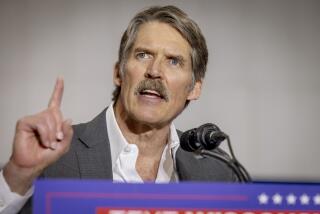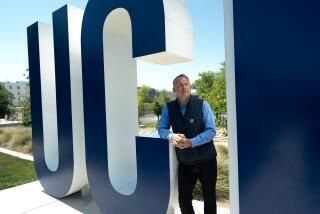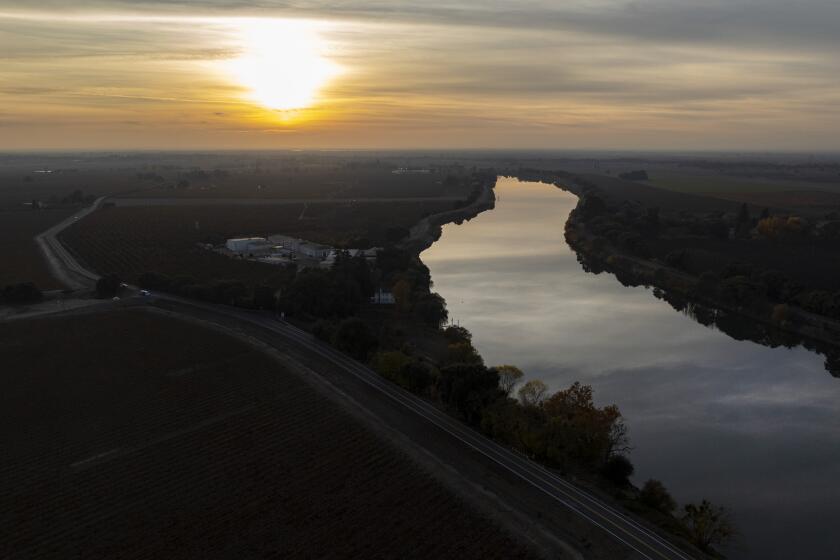At Pulpit, Gore Turns to Families
Making a rare and quick foray into the heart of Gov. George W. Bush’s Texas, but using a televangelist’s pulpit to reach a national audience, Vice President Al Gore said Sunday that the United States must not ignore suffering, whether in the Balkans or in American cities.
His reference to the Balkans was a response to Bush’s plan--if he’s elected--to pull U.S. peacekeeping troops out of their NATO mission in that troubled region of southeastern Europe.
Gore placed the Balkan mission in the broader context of American values in a 15-minute speech he delivered at the dedication of an immense church in Dallas.
“The time has come for us as a people to reach out to one another,” Gore said. “The time has come for us to say, no, we will not turn our backs on those who are suffering--whether they be in the Balkans or whether they be in south Dallas. We will stand for what is right.”
Later, speaking with reporters aboard Air Force Two, Gore went further, saying that without U.S. leadership, “NATO would face the risk of collapse over time. And without NATO, the peace in Europe that has been taken for granted for more than half a century now, would over time be at risk.
“I don’t think that’s an overstatement in any way, shape or form,” he said.
The Balkan issue was injected into the presidential campaign last week when Condoleezza Rice, Bush’s senior national security aide, said that in a Bush administration, the peacekeeping role would be turned over to European forces and the United States would gradually pull out of the Balkans.
In his Dallas speech, Gore distanced government from solving the problems of American families. “We will not have censorship, but we do need to have parenting,” the vice president said.
But, he said, “it’s time for the entertainment industry to stop peddling violence and indecency to young people in this country.”
The vice president used the speech, at the dedication of Potter’s House Church, an 8,200-seat sanctuary/television studio, “to come across to voters we don’t normally talk to,” campaign manager Donna Brazile said.
As he easily does when he finds himself in a pulpit, Gore employed a rhythm and intonation that tapped the tradition of the Southern churches where he worshiped during his childhood summers in Tennessee.
He shared the stage with such disparate speakers as the Rev. Pat Robertson, chairman of the Christian Broadcasting Network Inc. who sought the 1988 Republican presidential nomination, and Coretta Scott King, widow of the Rev. Martin Luther King Jr.
Calling for “a new commitment to strong families and strong values,” the vice president, with beads of perspiration forming on his face, said that “in the midst of prosperity,” parents are finding less time to share with spouses and children. “A cultural pollution” is overpowering the lessons of home and classroom, he said.
Echoing Bush, who said in a speech last week that “families [are] where our nation finds shape,” the vice president said: “Families are where we learn to love one another. . . . Families are where we learn that we, personally, have a power to affect the world around us.”
With campaign time precious, and Texas certainly beyond Gore’s reach on election day, the Dallas stop was peculiar.
“Most people would say the vice president is wasting his time coming to the state of Texas,” said Dallas Mayor Ron Kirk, speaking just before Gore. But he said the vice president had promised the pastor, T.D. Jakes, who spoke at the Republican National Convention, that he would attend the ceremony.
Sunday afternoon, Gore flew to Albuquerque to speak at the inauguration of the National Hispanic Cultural Center of New Mexico.
As the campaign draws to a close, the Gore campaign has set up an unorthodox daily routine: In the morning, at least at the start of this week, Gore will visit in families’ homes, stopping in on at least one couple before they send their children off to school, to engage in “kitchen table” talks about economic and family issues.
“We think it’s families like these who understand what’s at stake in this election,” said Douglas Hattaway, the campaign’s spokesman.
Later in the day, the vice president plans a series of single-topic speeches--the address Sunday was the first--that will focus on, among other topics, the evolving role of government in American society; the use of education to extend prosperity’s reach; the issues posed by the Internet, the new economy and privacy; and reducing the nation’s dependence on “big oil and foreign oil” while protecting the environment, spokesman Chris Lehane said.
Like the Bush campaign, Gore’s is focused on reeling in the diminishing slice of potential voters who have not made up their minds.
Although a segment of this group is known by pollsters as the “know-nothings,” who have ignored the race and may very well not vote, Lehane said others have been following the campaign carefully, are “highly informed” and want to hear specific policy proposals.
Stanley Greenberg, one of Gore’s pollsters, said in a conference call with reporters that the Democrat lost his lead after the first debate, on Oct. 3. After the vice president’s aggressive performance, Greenberg said, Gore’s lead among women, always greater than among men, began to dissipate.
But since then, he said, polls by the campaign show virtually no change; in other words, Bush has not been able to build on that shift, and Gore has not lost more ground, leaving the race virtually even when the polls’ margins of error are accommodated.
“It’s going to be a tough two weeks,” he said.
One ray of hope for Gore: Greenberg said the campaign’s polls have detected new support among the elderly who have responded to the vice president’s attacks on Bush’s Social Security proposals.
More to Read
Get the L.A. Times Politics newsletter
Deeply reported insights into legislation, politics and policy from Sacramento, Washington and beyond. In your inbox three times per week.
You may occasionally receive promotional content from the Los Angeles Times.






